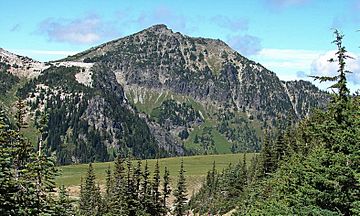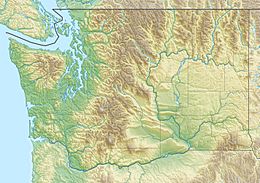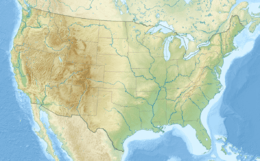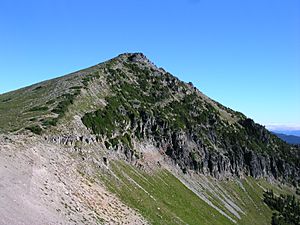Skyscraper Mountain facts for kids
Quick facts for kids Skyscraper Mountain |
|
|---|---|

Skyscraper Mountain seen from the southeast
|
|
| Highest point | |
| Elevation | 7,078 ft (2,157 m) |
| Prominence | 398 ft (121 m) |
| Isolation | 1.19 mi (1.92 km) |
| Parent peak | Mount Fremont (7,317 ft) |
| Geography | |
| Location | Mount Rainier National Park Pierce County, Washington, U.S. |
| Parent range | Cascades |
| Topo map | USGS Sunrise |
| Climbing | |
| Easiest route | Hiking trail class 2 |
Skyscraper Mountain is a tall peak in Mount Rainier National Park in Washington state. It stands about 7,078 feet (2,157 meters) high. This mountain is part of the Cascade Range, a long chain of mountains.
You can find Skyscraper Mountain northwest of the Sunrise Historic District. A four-mile hike from Sunrise leads towards the mountain. Most of this path is on the famous Wonderland Trail. While the trail doesn't go all the way to the top, you can walk the rest of the way from Skyscraper Pass. From the summit, you get amazing views of other peaks like Burroughs Mountain and Mount Rainier. Mount Fremont is the closest higher mountain.
Getting to Skyscraper Mountain depends on the weather. The road to Sunrise is often closed for much of the year due to heavy snowpack. Usually, July, August, and September are the best months to visit. During these months, the road is open for cars. Water from Skyscraper Mountain flows into streams that feed the White River.
Mountain's Name and History
The name Skyscraper Mountain was chosen because the peak looks like a modern skyscraper building. This idea came from Edmond S. Meany, who was a historian. The name became official in 1932. This was decided by the United States Board on Geographic Names.
Weather and Climate
Skyscraper Mountain is in a special climate zone called the marine west coast. This means it gets a lot of moisture from the Pacific Ocean. Most of the weather systems come from the Pacific and move towards the Cascade Range.
When these weather systems hit the tall Cascade Mountains, they are forced to rise. This process is called Orographic lift. As the air rises, it cools down and drops its moisture. This causes a lot of rain or snowfall on the western side of the Cascades. Because of this, winters here have a lot of snow.
In winter, the weather is often cloudy. But in summer, high-pressure systems over the Pacific Ocean become stronger. This often leads to clear skies with little or no clouds.
 | Bessie Coleman |
 | Spann Watson |
 | Jill E. Brown |
 | Sherman W. White |




